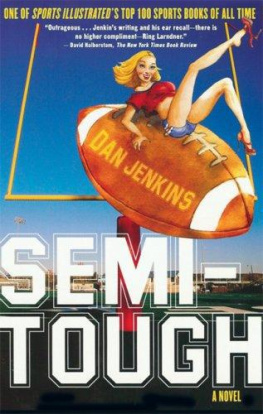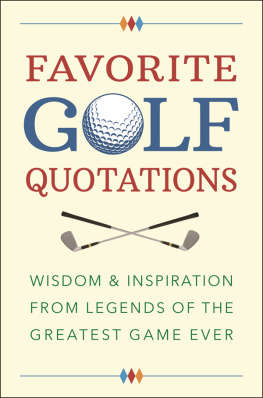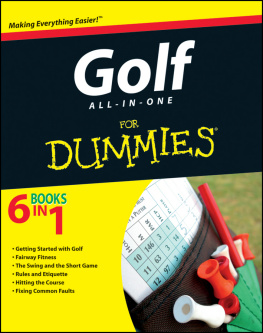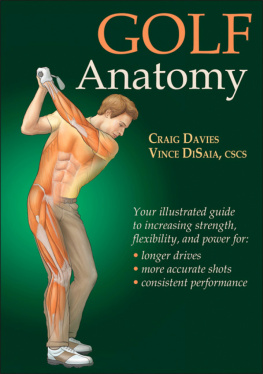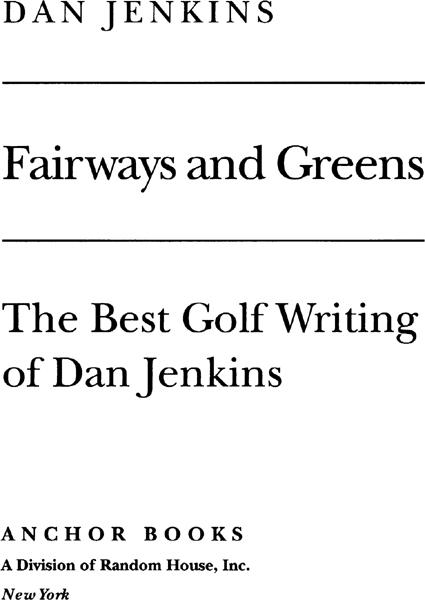This book is dedicated to a foursome:
for Bud Shrake, who has come to love golf more than
writing, or even tunafish;
for Dave Marr, who has never let golf interfere with
laughter;
for Don Matheson, another old friend who has always
been there;
and for Jerry Tarde, as fine an editor as ever lifted a
sentence out of a bunker and gave it a better lie.
Contents
Foreword
WHEN WORD began to circulate through pro shops, grillrooms, and various dark alleys that this collection was going to be brought outwell, you can imagine how chaotic things got around the house.
My twenty-four-hour Golfline was overwhelmed, for one thing. This is a counseling service that is normally subscribed to by people who want to be cured of talking about handicap indexes, the spin rate of square grooves, and the modified Stableford scoring system.
I must have received at least four calls from lovers of the game who begged me not to forget to include some of their old favorites. These were stories they thought they remembered reading in magazines once upon a time, although they werent entirely certain about the byline.
If the callers were in fact talking about my work, they were kind enough not to mention that the pieces had found an even greater usefulness around their homes in lining kitchen shelves for cans of pinto beans and jars of mustard.
The bulk of this stuff has appeared in magazines before, of course, in Golf Digest and Sports Illustrated, the two campuses where I have spent the past three decades lecturing to innocent bystanders and pretending to work for a living.
A few of the efforts have even sneaked into anthologies over the years, as Im sure you are aware of if you follow all of the urban disturbances caused by the frantic book-buying public where anthologies are concerned.
But there is quite a bit of fresh material here, either in the form of essays or what I would call a combination of transplants and face-lifts.
One of the pleasures of putting together a collection, I think, is being able to tamper with the old prose. You are occasionally inclined to scratch out or rewrite whole sentences, if not whole paragraphs. This is after you have slapped yourself around like one of the Three Stooges, and shouted, Jesus God, what idiot could have written that?
This book takes its title from a good many golfers I know who say Fairways and greens to friends the way other people say Drive carefully or Have a good life.
Fairways and greens, the way I generally use it, means I hope you make it through the day without getting hurt.
As for the name of the writer that appears in the subtitle, I can only remark on what an incredible coincidence it is.
D.J.
Preface
JACK NICKLAUS, comma.
Thats the line that would stay with most of us the longest, the thing that was most often said over a period of, oh, twenty-five years, I guess.
All it took was for Nicklaus to go up on the leader board. It didnt matter what round it was. It didnt matter how many strokes behind he might be. It didnt matter how many brand names were ahead of him. Somebody in the pressroom would say it.
Want some coffee?
Jack Nicklaus, comma.
Yep. Cream and sugar?
A whole quarter-century of my joyride in covering golf tournaments seemed to run parallel with Nicklaus winning golf tournaments.
I should mention that this was nothing to complain about. Not if you liked seeing your copy get good play.
The difference between Nicklaus winning a golf tournament, particularly a major championship, and a mere mortal winning a golf tournamentGod forbid a majorwas, like, huge.
For a newspaper slave, it could make the difference between a six-column headline and a two-column head. For a magazine servant, it could make the difference between a cover story and a spot in the back of the book with ice fishing.
So it goes in journalism, which doesnt make the news, it only delivers it to a readership that loves to fondle celebrities.
In golf, this has never made the mere mortals happy. But the truth is, it has always made editors happy back in the office, editors by and large being a subnormal form of human life, people who seldom get to go to the Monterey Peninsula or St. Andrews as often as golf writers do.
Its an astonishing thing, but I sometimes found myself being congratulated for a job well done by a boss of one kind or another in my Sports Illustrated days when Nicklaus pulled out a victory in a major, something like a Masters. It was as if I had been personally responsible for saving the publication that week.
At the same time, I could catch a share of the blame if I had been careless enough to allow a mere mortal to win, a fellow along the lines of a George Archer, a Dave Stockton, or a Lou Graham.
How could you have let that happen? an editor back in the office would say, rather coolly, and only half-joking.
Which reminds me of the time I made a bad joke in print about George Archer. I said something like he would still come up short on charisma if he happened to be riding in a golf cart with Jill St. John. Something brilliantly tasteless like that.
A week or so later, I received a testy letter from Mrs. George Archer, who said, among other things, I will have you know that my husband has more charisma than Joe Namath and Gary Cooper combined!
While I was amused to see those two names lumped together in the same context, I left the response up to a cynical cohort in the pressroom. He read that part of the letter, and said, Shes rightNamaths got a busted knee and Gary Coopers dead!
There was this occasion when I strongly suggested in print that Arnold Palmer should have won the PGA Championship in 1970 at Southern Hills in Tulsa instead of Dave Stockton, who was then a member of the tours invisible rank and file.
I wasnt the only writer who thought Palmer had played the best golf that week and Stockton had played the luckiest golf that week, but I was the guy who wrote it in Sports Illustrated, which had color pictures, and that evidently compounded the crime, as Stockton saw it.
Stockton didnt understand or appreciate that angling the piece around Arnold focused ever more attention on him, the winner.
But no matter. A few weeks later, the responsibility of defending me fell upon Bob Drum, an old pressroom compatriot. Legend has it that during a tournament in New Jersey, Stockton went up to Drum and in a rather fierce tone of voice said, Is Jenkins here? I want to talk to him!
Calmly, Drum said, I dont think hes coming this week. Whom shall I say is asking?
One of my favorite moments involving mere mortals occurred in 1975 at the U.S. Open at Medinah outside of Chicago, where Lou Graham and John Mahaffey wound up in an 18-hole playoff.
The fact that I would be forced to stay over another day did not annoy me. I am proud to say that I am not one of those poets who gripe about 18-hole playoffs. I think all majors are too important to be settled at sudden death, and it saddens me that the Masters, British Open, and PGA have all caved in to the wishes of network television, which cares a lot less about golfs traditions than it does about the commercials in daytime soap operas.
Anyhow, Lou Graham won the playoff at Medinah and now Im on a furious Monday deadline, and Im trying to work in the usual slum of a USGA press tent. Its boiling hot, the workspace is cramped, and there arent even any soft drinks available anymore. Unions dont do playoffs, some guy explained.



